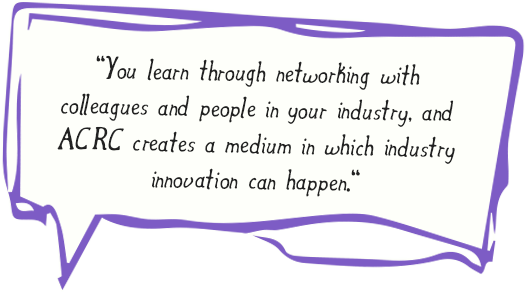An International Network
ACRC’s exceptional and diverse members are the true voice behind our organization, actively guiding our mission and daily work. Our members include large and small agencies, individuals, students, and fellows.

Benefits
- Authentic advocacy for children and families with complex mental health needs
- Opportunities to participate in ACRC research projects and committees
- Ongoing networking opportunities
- Webinars on emerging trends and hot topics – complimentary NASW CEUs available for most events
- Online access to the Residential Treatment for Children and Youth Journal
- Job postings on our website
- Discounts at our Annual Meeting for all ACRC Agency Members staff
- Representation in associations and coalitions
- Public policy and advocacy efforts
- Affinity groups available to collaborate over the specific work you do
- New Agency, Public Partner, Associate, and state Association members receive one free registration for our next annual conference
- ACRC Agency Members receive a 25% discount off accreditation and re-accreditation fees through the Council on Accreditation!
Along with these benefits, ACRC members highly value the collaborations available through ACRC’s extensive network. Our unique focus provides members with unparalleled opportunities to connect with others in the field, advance clinical knowledge, and better address the needs of children in residential treatment and their families.

Annual Investment
What type of Membership works best for you or your organization?
AGENCY
Agency membership fees are based on overall organizational budget and may be prorated for mid-year applicants.
Under $2.5 million
$2,500/year
$20-$25 million
$4,250/year
$45-$50 million
$5,500/year
$2.5-$5 million
$3,250/year
$25-$30 million
$4,500/year
$50-$60 million
$5,750/year
$5-$10 million
$3,500/year
$30-$35 million
$4,750/year
$60-$70 million
$6,000/year
$10-$15 million
$3,750/year
$35-$40 million
$5,000/year
$70-$80 million
$6,250/year
$15-$20 million
$4,000/year
$40-$45 million
$5,250/year
$80 million and above
$6,500/year
Individual
$345/year
Student
$90/year
State Association
$1,100/year
Associate
$1,100/year
Public Partner
$3,000/year
Principles and practices
In keeping with the Association of Children’s Residential & Community Services’ mission, we have been working with our membership and partners to identify key programmatic and practice changes that promise to advance the field. We request that current and prospective members become familiar with and endorse these principles and practices.
Please review the information below. In the membership application, you will be asked to verify that your agency endorses and strives to implement these principles in your programs. The references offer practical tips to organizations in the field about these principles and practices. Please contact us if you have questions.
- Family-Driven Practice (Reference 1, 2)
- Youth-Guided Practice (Reference)
- Comprehensive Assessments Drive Placement Decisions (Reference)
- System of Care and Building Bridges Initiative Principles (Reference)
- Licensing, Regulation, Accreditation and Standards Provide the Foundation and Framework for Best Practices (Reference)
- Performance Indicators and Outcomes Establish Credibility for Individual Organizations in the Field (Reference)
- Evidence-Based Practices Support the Ultimate Goal of Improved Outcomes (Reference)
- Trauma Informed Care in Residential Treatment (Reference)
- Measuring Functional Outcomes (Reference)
- Creating Non-Coercive Environments (Reference)
- Towards the Rational Use of Psychotropic Medication (Reference)
- Ensuring Competent Residential Interventions for Youth with Diverse Gender and Sexual Identities and Expressions (Reference)
- Strategic Interventions to Advance Youth Permanency (Reference)
- Integrating Education in Residential Interventions (Reference)
- Trauma Informed Practice: Moving Away from Point and Level Systems (Reference)

